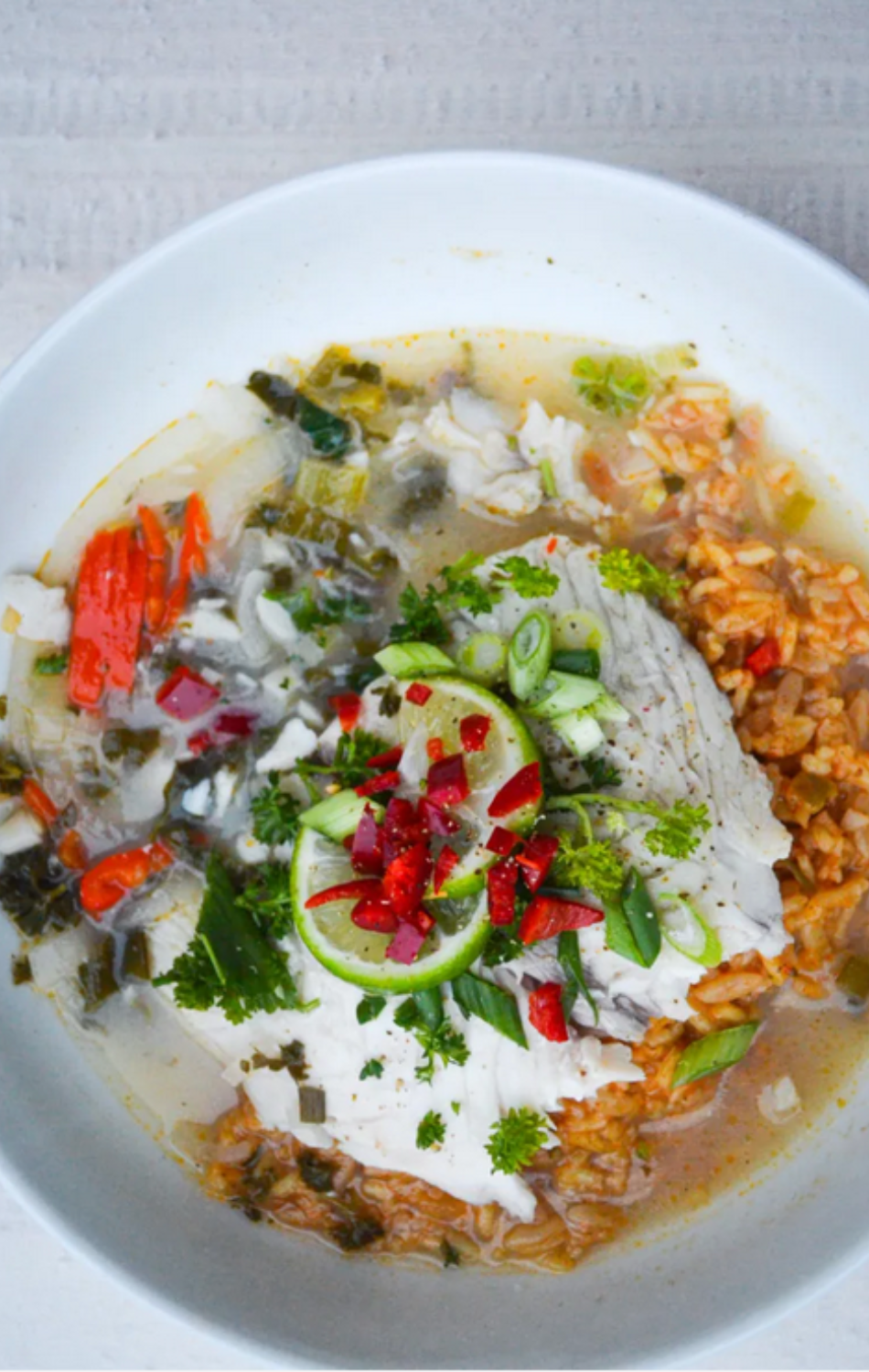Edition 35
June 2025
The Power of Presence - Even in Small Measures
By Shola Oladipo, Food for Purpose CEO
Hello Readers, Welcome to the month of June!
This month’s edition is one of my favourites. I guess I am biased, as I could say the same for last month, too! Thank you for your faithful support and interaction - we appreciate you.
I have been thinking about cooking and ingredients. I note there are some ingredients that only need to be added in tiny amounts to transform an entire dish. One of them is the scotch bonnet - aka ‘ata rodo’ as we say in Nigeria.
Small, vibrant, and fiery - this pepper doesn’t need to dominate the pot to make an impact (please take note my pepper lovers). Whether you’re preparing rice and peas, oxtail stew, obe ata or jolloff, that one piece, even when left whole, changes everything. Its presence brings depth, warmth, and unmistakable flavour. And just like scotch bonnet, you don’t need to be loud or everywhere to make a difference this month. Sometimes, just showing up in small but intentional ways is enough to shift everything — in your household, your workplace, your community, or within yourself.
Showing up
In our culture, we often celebrate the big gestures — the leader with the mic, the loud voice in the room, the person doing the most. But that’s not always where the power lies. Scotch bonnet isn’t the main ingredient, but it leaves one of the strongest impressions…the same goes for people.
You might be the one in the background, the person who listens, the one who shows up with quiet consistency. You might be the one preparing the meal, supporting your family, or trying to make healthier choices for your body and mind. It might not look flashy, but it’s impactful. Showing up can be subtle. A decision. A conversation. A new habit. But when it’s done with intention, it can change the direction of your day — or even your life.
Showing up for yourself
Many of us have learned how to show up for others. For the kids. For the church. For work. For the community. But what about you? What does it look like to show up for yourself, not in a self-centred way, but in a way that honours your health, your needs, your purpose? That might look like taking the time to prepare a meal with intention instead of grabbing something quick or getting outside for fresh air and movement. Checking in with your mental and emotional well-being is key. Just like you check the seasoning in a pot, check in with yourself. Are you under-seasoned? Overworked? Forgotten in the back of the fridge? You matter. And your care for yourself is not optional — it’s foundational.
Small Acts, Big Difference
You don’t have to take giant leaps every day. Real change often comes through small, consistent steps. That’s true in food, in health, in relationships, and in purpose.
Think about it, one decision to drink water today instead of a sugary drink, or one decision to eat a colourful plate instead of skipping meals. These things might feel small in the moment, but they compound. They season your life over time.
Like the scotch bonnet, you don’t need to take up the whole pot to bring flavour — you just need to be there, present, intentional. We often think showing up means doing more. But sometimes, it means doing less by simply saying no, especially in Black communities, where strength and endurance are often glorified, we need to give ourselves permission to rest, recover, and reset.
Rest is not weakness — it’s wisdom.
Even the most flavourful ingredients need time off the heat.
Keep believing
There’s a story in the Bible of a woman who had been suffering for years. Tired, worn out, and discouraged — but she still made the choice to show up and reach for healing. She didn’t have a platform or a plan. She just had enough belief to take one step. That was enough. You don’t need to have it all figured out. You don’t need a perfect body or perfect faith. You just need to show up with what you have and receive God’s strength.
Keep Stirring
There’s power in just turning up — not because you have all the answers, but because you’re willing to keep stirring the pot. Even when the process is slow. Even when the heat feels intense. Even when you’re not sure what the end result will be.
Your decision to be present — to look after your health, to grow emotionally, to nurture your purpose — is seasoning your life and those connected to you.
Like the scotch bonnet, your impact is not in your size or volume — it’s in your essence.
So whether today’s showing up means preparing a proper meal, taking a walk, saying no, or simply choosing rest, know that it counts.
Blessings!
Shola
CEO Says - The Power of Presence - Even in Small Measures
HCI News - The Healthy Church Initiative Launch - Greenwich
Physical Activity Tips - The Benefits of Swimming for Fitness (and How to Protect Your Crown!)
Recipe of the Month - Fish Blaff (Caribbean Lime-Poached Fish)
A-Z of Soul Food - Habanero
Diabetes Tips - Diabetes Education – Empowering People with Diabetes for Better Health
Let’s Talk - Food in Mouth? Don't Talk!
Time to Talk
Time to talk is an important Greenwich based service encouraging people to talk! Are you feeling worried, stressed or low in mood? Do you feel stuck with these emotions? Have they become
overwhelming? Are they affecting your relationships or day-to-day life? Greenwich Time to Talk is your local NHS Talking Therapies service and we’re here to help you feel better.
Contact - Greenwich Time to Talk
Bungalow 3, Wensley Close
Eltham, London SE9 5AB
Tel: 020 3260 1100
Email: oxl-tr.greenwichtimetotalk@nhs.net
www.oxleas.nhs.uk/gttt
The Faith Research Network
Our CEO presented our award-winning HCI at the Faith Research Network, through the Academic Community Research Implementation Programme (ACRIP) and supported by the North London Regional Research Delivery Network.The event took place at Christ the Redeemer College in Harrow and was attended by academics, students and healthcare delivery teams. She spoke about the importance of faith-based interventions, the Black Majority churches and health promotion programmes as part of holistic healthcare delivery.
Lewisham Food Justice - Two Years On Event
Our CEO presented our award-winning HCI at the Faith Research Network, through the Academic Community Research Implementation Programme (ACRIP) and supported by the North London Regional Research Delivery Network.The event took place at Christ the Redeemer College in Harrow and was attended by academics, students and healthcare delivery teams. She spoke about the importance of faith-based interventions, the Black Majority churches and health promotion programmes as part of holistic healthcare delivery.
10 Key Points from the UK Obesity Profile (May 2025)
This recent report published on 7.5.25, summarises obesity indicators in England. The Office for Health Improvement (OHID) focuses on:
Overweight and obesity prevalence
Physical activity and inactivity
Consumption of 5 or more portions of fruit and vegetables per day
10 Key Points from the UK Obesity Profile (May 2025)
Childhood obesity rates are decreasing: For the first time in years, obesity among reception-age children (4-5 years) has fallen to 9.2% and to 20.5% among Year 6 children (10-11 years).
Regional disparities persist: Children in the most deprived areas are more than twice as likely to be obese compared to those in the least deprived areas.
Adult obesity continues to rise: 28% of adults in England are now classified as obese, with 64% being either overweight or obese.
Hospital admissions increasing: Over 1 million hospital admissions in 2023/24 were directly related to obesity, a 10% increase from previous years.
Economic burden growing: Obesity-related conditions now cost the NHS an estimated £8.8 billion annually and have wider economic impacts of about £29.3 billion.
Diabetes connection: Nearly 90% of people with type 2 diabetes are overweight or obese, highlighting the strong relationship between these conditions.
Demographic trends changing: Men (65%) are now more likely than women (57%) to be overweight or obese, reversing historical patterns.
Geographic hotspots: The North East has the highest adult obesity rates at 33%, while London has the lowest at 23%.
Government interventions showing promise: School-based programs and community initiatives appear to be having positive effects on childhood obesity rates.
Future outlook cautiously optimistic: While adult obesity continues to rise, the decline in childhood obesity suggests potential long-term improvement if current strategies are maintained and expanded.
Link to publication: https://www.gov.uk/government/statistics/obesity-profile-may-2025-update/obesity-profile-short-statistical-commentary-may-2025#whats-new
Volunteers Week
2nd - 8th of June is Volunteers week - we are blessed with amazing volunteers at FFP. We say a massive thank you and God bless to all our kind hearted team and advisory group who support selflessly!
National Days / Weeks / Month - June 2025
June 2nd – 6th - Dietitians week
June 2nd - 8th - Volunteers' Week
June 9 – 15th Diabetes Awareness week
June 9th-15th - Bike Week
June 9th – 15th – Men’s Health week
June 22nd - Windrush Day
The Healthy Church Initiative Launch - Greenwich
What a fantastic local launch! We were absolutely thrilled with the turnout and the energy in the room. Together, we shared in powerful and thought-provoking conversations led by Pastor Tim Oladipo, Pastor Richard Opedare, and Rev Timmy Ajayi, focusing on the importance of openness around illness and prioritising physical health within the Black Majority Church (BMC) community.
We were especially honoured by the surprise attendance of Apostle Alfred Williams, who enriched the evening with his wisdom, inspiration, and powerful testimony of health.
The event was beautifully facilitated by Kelly Ann Ibrahim, Public Health Strategist from the Royal Borough of Greenwich. We were also pleased to welcome Councillor Jahdia Spencer, Neil Kenneth-Brown from the Integrated Care Board, and Reshma Jerome from Oxleas, who reminded us of the borough-wide ‘Time to Talk’ talking therapy service.
It was a truly uplifting evening, filled with meaningful dialogue and a shared commitment to community wellbeing.
A heartfelt thank you to our phenomenal FFP Ops team and the dedicated volunteers who worked tirelessly behind the scenes to make it all happen.
Onwards and upwards!
The Benefits of Swimming for Fitness (and How to Protect Your Crown!)
By Precious Oladipo
FFP Director & Physical Activity Lead
If you’re like me, you might have a complicated relationship with swimming. Between the chlorine, shrinkage, and keeping those knotless braids or fresh locs intact, diving into the pool can feel like a whole situation! But let’s talk about why you should consider dipping your toes (or maybe a whole foot) into the water for fitness, and how to protect your hair while you do it.
Why Swimming?
Swimming is one of the best full-body workouts. It’s low-impact, easy on the joints, and targets muscles you didn’t even know you had! Whether you're doing laps or just treading water, swimming can help improve cardiovascular health, build strength, and boost endurance, all while having fun. And let’s be real, who doesn’t want to work out without breaking a sweat?
But there’s a bigger picture here too. Statistics from Sport England show that 95% of Black adults don’t swim. That’s a huge number! And part of it could be because of hair care concerns or just not growing up with swimming as a family tradition. But learning to swim is not only a great way to stay fit, it’s also a life-saving skill. Plus, it’s empowering to break those statistics and dive into something new.
Ready to Learn? You’re Not Alone
The beautiful thing is, you don’t have to go it alone. Across the UK and beyond, there are Black-led organisations doing the work to make swimming more accessible, welcoming, and joyful for our community.
Swim Dem Crew is a London-based collective making waves (literally) by building a safe, inclusive space for global majority communities to learn to swim and enjoy the water, no matter their background or skill level.
Black Swimming Association (BSA) is doing incredible work tackling barriers and promoting aquatic education across African, Caribbean, and Asian communities.
Soul Cap not only makes game-changing swim caps for voluminous hair, but also champions diversity in swimming and supports grassroots efforts to close the racial swim gap.
These groups are out here shifting culture, building confidence, and reminding us that swimming is for everyone, yes, even if you’re learning as an adult, and yes, even if you’re worried about your hair!
Hair Care: Keep Those Braids Fresh!
I know hair is a BIG deal, especially when you’ve just spent hours sat in a chair getting it done, or want to avoid the dreaded 4C shrinkage. But don’t let that stop you from enjoying the pool. Here’s how you can dive in without sacrificing your hair health:
Double Up on Swim Caps: First, find an extra-large swim cap designed for voluminous or protective styles. Brands are catching on and making swim caps to fit Black hair needs. Wear a snug silicone cap underneath and then a larger one (like from Soul Cap) on top for maximum protection.
Pre-Treat Your Hair: Before swimming, coat your hair with a little leave-in conditioner or natural oils like coconut or jojoba. This adds a layer of protection and keeps the chlorine from penetrating your strands.
Rinse Before and After: Wet your hair before getting into the pool—this way, it absorbs less chlorine. Afterward, thoroughly rinse out any pool water with fresh water and use a clarifying shampoo. Follow up with a deep conditioner to restore moisture.
Protective Styles: Knotless braids, twists, or cornrows are perfect for swimming. They keep your hair contained and reduce tangling. Just give your scalp some love post-swim!
Make a Splash—It’s Fun and Freeing!
Beyond the amazing fitness benefits, swimming is just fun! It’s freeing to glide through the water, and the weightlessness makes everything feel a little easier. Not to mention, it’s a great social activity, you can take a class with friends, enjoy pool days with family, or unwind with a solo swim. It’s all about changing the narrative.
So sis, and my brothers too, grab that swim cap, protect your crown, and dive into a new way to stay fit, empowered, and refreshed. Whether you’re learning to swim or gliding like a mermaid, every splash is a step toward breaking barriers.
Fish Blaff (Caribbean Lime-Poached Fish)
This month, we're excited to take a trip to the beautiful Caribbean Islands for a delicious dish called fish blaff. Blaff is a beloved traditional Caribbean meal, particularly popular in St. Vincent and the Grenadines. You can make it with various types of fish and seafood, but it’s often prepared with a delightful mix of cod or seabass.
The fish is lovingly marinated in a tasty blend of onions, lime juice, garlic, and spicy hot peppers, then gently poached in the marinade. This wonderful dish pairs perfectly with fluffy rice pilaf or sweet boiled plantain and fresh vegetables.
Serves 4
Preparation time: 2hr 15minutes (including time to marinate)
Cook time: 30 minutes
Total time: 2hr 45 minutes
Ingredients
1kg cod steaks
4 limes
4 cups water
4 scallions, chopped
3 garlic cloves, minced
1 minced scotch bonnet
1 teaspoon allspice
A few sprigs parsley, chopped
1 teaspoon salt
Method
Place the fish in a large bowl, add 2 cups of water and the remaining ingredients, squeeze in the limes, cover, and allow the fish to marinate in the fridge for at least an hour or overnight.
Remove the fish from the marinade and set it aside. Add the marinade along with the remaining two cups of water to a large pot, and bring to a boil over medium to high heat. Then, reduce the heat to medium-low and simmer for about five minutes.
Add the fish to the simmering broth and cook for approximately 10 minutes, or until the fish is fully cooked and flakes easily.
Adjust the seasoning to your taste and serve with rice or boiled plantain alongside vegetables.
Variations
Substitute vinegar or lemon juice for limes
Pictures courtesy of: https://www.gourmettraveller.com.au/recipe/chefs-recipes/blaff-of-snapper-steaks-marinated-in-lime-7320/
https://globalkidchen.com/caribbean-recipe-blaff/
Recipe courtesy of: https://www.whats4eats.com/fish/blaff-recipe
Habanero
This month, we’re celebrating Habanero for the letter H!
Habanero is one of the hottest and most flavoursome chilli peppers in the world. Originally from the Amazon region and now widely cultivated in Mexico, certain parts of the United States of America, and the Caribbean, the habanero is cherished not only for its fiery heat but also for its fruity, slightly citrusy undertones. These small, lantern-shaped peppers range in colour from green to orange to deep red as they ripen and are a staple in hot sauces, marinades, and spicy dishes.
PLEASE NOTE: Habaneros are very spicy, significantly hotter than jalapeños and scotch bonnets, requiring careful handling. Always wash your hands after handling them and consider using gloves if you are sensitive to chili oils.
Nutritionally, Habanero:
Is rich in capsaicin, the compound responsible for its heat. Capsaicin is known for its anti-inflammatory and pain-relieving properties and may help support digestion.
Supports immune health, as habaneros are high in vitamin C, an antioxidant that strengthens the immune system and promotes healthy skin.
Where to Find Habanero in the UK
Supermarkets and Ethnic Grocery Stores: Fresh and dried habaneros, as well as habanero-based hot sauces, are increasingly available in larger supermarkets and Caribbean, African, or Latin American stores.
Diabetes Education – Empowering People with Diabetes for Better Health
By Modupe Peters
FFP Director & Diabetes Lead
Do you live with diabetes, or do you have a family member who does, but haven't received structured diabetes education? This article will cover everything related to diabetes education for individuals with diabetes in the UK. Diabetes education plays a vital role in the management and prevention of complications associated with the condition.
Programmes for Type 2 Diabetes
DESMOND (Diabetes Education and Self-management for Ongoing and Newly Diagnosed): This structured group education programme consists of sessions that focus on understanding diabetes, making lifestyle changes, and developing self-management strategies. Typically, it is offered as a full-day session or two half-day sessions, with both virtual and in-person options available in areas where the programme is conducted.
HEAL-D (Healthy Eating and Active Lifestyles for Diabetes): A culturally tailored educational programme aimed at individuals of African and Caribbean descent. This programme emphasises modifying traditional meals to be more diabetes–friendly while preserving their cultural significance. It is presently offered to adults with diabetes residing in South London.
X-PERT Health (Expert Education versus Routine Treatment) offers group education programmes for those with prediabetes, type 1 and type 2 diabetes, and obesity. Their courses focus on empowering individuals through knowledge and self-management skills
EMPOWER Diabetes Education programmes: These programmes aim to enhance understanding and management of type 2 diabetes through interactive sessions
Healthy Living for People with Type 2 Diabetes: This online programme is available for free on the NHS, offering evidence-based education on diet, exercise, and emotional well-being.
Programmes for Type 1 Diabetes
BERTIE (Beta cell Education Resources for Type 1 Diabetes): An online course designed to help individuals with type 1 diabetes better understand and manage their condition.
DAFNE (Dose Adjustment for Normal Eating): A structured education programme teaching flexible insulin therapy for adults with type 1 diabetes, focusing on adjusting insulin doses to match carbohydrate intake.
Currently, there are over 4 million people living with diabetes in the UK, particularly type 2 diabetes. Research has shown that diabetes education plays a significant role in managing the condition. If you are newly diagnosed with diabetes, or have had diabetes for some time without receiving structured diabetes group education, speak to your healthcare provider to be referred to a local diabetes group education programme.
Food in Mouth? Don't Talk!
We all know that one rule at the dinner table: don't talk while eating!
It's upsetting, but we all do it sometimes, right? Have you ever tried to share a thought while chewing and ended up spraying bits of food instead? Yep - nasty and embarrassing - but happens so often. I used to think it was just children who were guilty, but nope, we adults are prime examples of this.
Nature makes it hard to eat and talk at once—why? because it is not supposed to happen! So let’s resist the urge to defy nature, no matter how exciting, important, or urgently pressing it may be—don't do it! Whatever we have to say will sound much better without the food sound effects and accompanying spray effect.

Let's keep in touch
For general enquiries about Food for Purpose:
For Newsletter enquiries / content suggestions:




































